Why is GS Ayurveda Medical College and Hospital the Best Private Ayurvedic Medical College in Uttar Pradesh
The GS Ayurveda Medical College and Hospital is renowned and a Top Ayurvedic College in Ghaziabad UP, for being a leader in Ayurvedic education in Uttar Pradesh. With a robust curriculum, exceptional faculty, and a student-centered approach, it has quickly gained a reputation as the best private Ayurvedic College in Uttar Pradesh. But what sets GS Ayurveda apart from the rest? Let's explore!
The Rich Heritage of Ayurvedic Education in India:
Ayurveda is an ancient Indian system of medicines which has managed to thrive itself even after thousands of years since its inception which shows that it has stood the test of time. With its roots in Vedic culture, it’s not just a medicine but a systematic approach to live a healthy, happy and blissful life.
Brief History of Ayurveda:
Ayurveda is one of the oldest systems of medicine known to the world whose remedies are well written in many great ancient Indian texts. It is based on the principle of conglomeration of three aspects of human body i.e. mind, physical body and inner soul.
Ayurveda originated in India around 3,000 BC, making it one of the oldest healing sciences known to mankind. The system is based on ancient texts such as the Charaka Samhita and Sushruta Samhita, which describe various treatments, surgical procedures, and medicinal herbs used to promote health and longevity.
Importance of Ayurveda in Modern Times:
With the growing interest in natural and holistic health approaches, Ayurveda has seen a resurgence. Its emphasis on personalized care, natural remedies, and preventive health is appealing to those seeking alternatives to conventional medicine. It’s not just about herbal remedies anymore; today’s Ayurveda integrates diet, yoga, meditation, and even modern diagnostic techniques to provide comprehensive care. GS Ayurveda Medical College embraces this resurgence by providing a contemporary, yet authentic Ayurvedic education.
What is an Ayurveda Course?:
Ayurveda courses are specialized programs designed to educate students about Ayurvedic principles, treatments, and practices. These courses range from diploma and bachelor’s degrees to master’s and doctoral programs, providing in-depth knowledge of Ayurvedic medicine, herbs, nutrition, and therapy. The Leading Ayurvedic Medical Colleges in UP have an in-depth curriculum especially designed for its students.
Course Structure and Curriculum:
A typical Ayurveda course includes both theoretical and practical training. Students learn about anatomy, physiology, pathology, pharmacology, and Ayurvedic medicine. Courses also often include internships at Ayurvedic clinics or hospitals to give students hands-on experience.
Key Subjects Covered: Subjects like Ayurvedic pharmacology (Dravyaguna), surgery (Shalya Tantra), clinical medicine (Kayachikitsa), and Panchakarma (detoxification treatments) are core to the curriculum, allowing students to gain a comprehensive understanding of the practice.
Benefits of Studying Ayurveda:
Holistic Approach to Health:
Ayurveda doesn’t just treat symptoms; it addresses the root cause of health issues by focusing on the overall balance of the body. This approach provides a more profound healing experience, making it a unique field of study compared to conventional medicine.
Personal Growth and Wellness:
Studying Ayurveda isn’t just about learning how to heal others; it’s also about enhancing your own health and well-being. The teachings encourage a balanced lifestyle, mindful eating, and self-care, which can transform your life while you study.
Lucrative Career Opportunities:
As awareness of natural and holistic treatments grows, so does the demand for qualified Ayurveda practitioners. Whether you aspire to open your own clinic, work in wellness tourism, or conduct research, Ayurveda offers diverse and rewarding career paths.
Career Opportunities in Ayurveda:
Clinical Practice:
Many graduates go on to work in Ayurvedic hospitals or open their own clinics, providing personalized care to patients using natural remedies, dietary advice, and lifestyle modifications.
Ayurvedic Wellness Centers and Spas:
The wellness industry is booming, with Ayurvedic therapies being a popular offering at luxury spas, wellness retreats, and holistic health centers worldwide. Practitioners can work as therapists, consultants, or managers in these settings.
Research and Development:
With growing interest in Ayurvedic treatments, there’s a need for research professionals to validate traditional remedies scientifically. Graduates can work in pharmaceutical companies, research labs, or academic institutions dedicated to advancing Ayurvedic knowledge.
Global Demand for Ayurveda Practitioners:
Ayurveda’s popularity isn’t confined to India; it’s expanding rapidly across the globe, from Europe to the United States. With rising demand for natural and holistic healing, trained Ayurveda practitioners are sought after internationally, providing opportunities for global practice and travel.
Why Ayurveda Stands Out Among Other Healthcare Courses:
Natural and Sustainable Healing Methods:
Unlike conventional medicine, which often relies on synthetic drugs, Ayurveda uses natural ingredients like herbs, oils, and minerals. This sustainable approach not only supports the body’s healing process but also minimizes side effects.
Focus on Prevention Rather Than Cure:
Ayurveda emphasizes preventing illness before it starts. By focusing on diet, lifestyle, and mental health, Ayurveda promotes long-term wellness, making it a proactive rather than reactive approach to healthcare.
What to Look for in a Good Ayurveda Course:
Accreditation and Recognition:
Ensure that the course is accredited by a recognized institution or body, such as the Central Council of Indian Medicine (CCIM) in India. Proper accreditation guarantees that the education meets industry standards and enhances career prospects.
Quality of Faculty and Facilities:
The quality of the faculty, clinical facilities, and practical training are crucial. Experienced instructors and access to well-equipped clinics or hospitals will significantly enrich your learning experience.
Challenges of Studying Ayurveda:
Balancing Traditional Knowledge with Modern Science:
One of the challenges in Ayurveda education is simultaneously studying ancient practices with contemporary scientific approaches. This requires a flexible mindset and a willingness to explore both worlds.
Time Commitment and Study Load:
Ayurveda courses are rigorous and demand a lot of time and dedication. Balancing theory, practicals, and internships can be challenging, but the rewards of becoming a skilled practitioner make the effort worthwhile.
Distinctive Attributes of the Institution:
When it comes to Ayurvedic education, GS Ayurveda Medical College and Hospital sets the bar high with its unique blend of traditional knowledge and modern facilities.
State-of-the-Art Infrastructure:
The college boasts a modern infrastructure that complements the study of this ancient science. From well-equipped labs to advanced research facilities, everything is designed to foster a comprehensive learning environment.
Modern Classrooms with Traditional Touch:
The classrooms at GS Ayurveda are a perfect blend of modern amenities and traditional design, offering a serene environment conducive to learning. The use of multimedia tools enhances the learning experience while staying true to the essence of Ayurveda.
Comprehensive Library Facilities:
The library is a treasure trove of Ayurvedic knowledge, featuring an extensive collection of ancient texts, research papers, and modern publications that support both learning and research.
Experienced Faculty with a Deep Understanding of Ayurveda:
The college prides itself on having a team of highly experienced faculty who are not only well-versed in the classical texts of Ayurveda but are also actively involved in research and clinical practice. This ensures that students studying at this renowned institute receive a well-rounded education.
Holistic Learning Approach:
At GS Ayurveda Medical College, the focus is on a holistic learning approach that integrates both practical and theoretical knowledge.
Blend of Practical and Theoretical Knowledge:
The curriculum is designed to provide students with a thorough understanding of the principles of Ayurveda, as well as hands-on experience in applying these principles in real-world scenarios.
Hands-on Training in Ayurvedic Treatments and Therapies:
Students receive practical training in a wide range of Ayurvedic treatments and therapies, from Panchakarma to herbal medicine preparation, ensuring they are well-prepared to practice Ayurveda in various settings.
Reasons to Choose GS Ayurveda Medical College for Your Ayurvedic Education:
If you're contemplating pursuing a career in Ayurveda, GS Ayurveda Medical College offers several compelling reasons to choose it as your educational institution.
Strong Placement Record:
The college has a strong placement record, with graduates working in reputable Ayurvedic hospitals, wellness centers, and research institutions across the country.
Focus on Research and Innovation:
Research is of the foremost importance at GS Ayurveda Medical College. Students are encouraged to engage in research activities that contribute to the advancement of Ayurvedic knowledge and practices.
Collaborative Environment with Other Institutions:
The college collaborates with other renowned institutions and hospitals, providing students with opportunities for interdisciplinary learning and research.
Campus Life at GS Ayurveda Medical College and Hospital:
Life at GS Ayurveda Medical College is about more than just academics. The campus is a vibrant place where students can engage in a wide array of extracurricular and cultural activities.
A typical day for a student at GS Ayurveda involves a mix of classroom learning, practical sessions, library research, and relaxation in the serene campus environment.
Cultural and Extracurricular Activities:
The college encourages participation in cultural events, sports, and extracurricular activities, fostering a well-rounded development for its students.
Herbal Garden:
The Campus has a beautiful herbal garden in which students are actively involved and take care of the garden themselves. The garden has all the herbal leaves and plants thriving depicting Indian healing system of medicine. The garden is spread over a large area and is one of the main attractions of the Institute. The students are practically taught there about the uses of various medicinal plants, and how to grow them and take care of these plants.
FAQs
1. What courses are being offered by GS Ayurveda Medical College?
The college offers undergraduate course of BAMS of the Ayurveda.
2. What are the admission requirements?
Admission is based on academic performance and entrance exams like NEET.
3. Is there a hostel facility available?
Yes, the college has a separate boys and girls hostels facility with an option ranging from single, double or triple occupancy and A/C, non A/C room as per the demand of the students.
4. Does the college provide scholarships?
Yes, there are scholarship programs available based on the merit and economic condition of the students.
5. Can international students apply?
Absolutely! GS Ayurveda Medical College welcomes applications from international students.
Conclusion
With its rich heritage, experienced faculty, and a commitment to both traditional and modern Ayurvedic education, GS Ayurveda Medical College and Hospital truly stands out as the best private Ayurvedic medical college in Uttar Pradesh. If you're passionate about Ayurveda and looking for a place that offers a comprehensive and holistic education, GS Ayurveda is the place to be!

